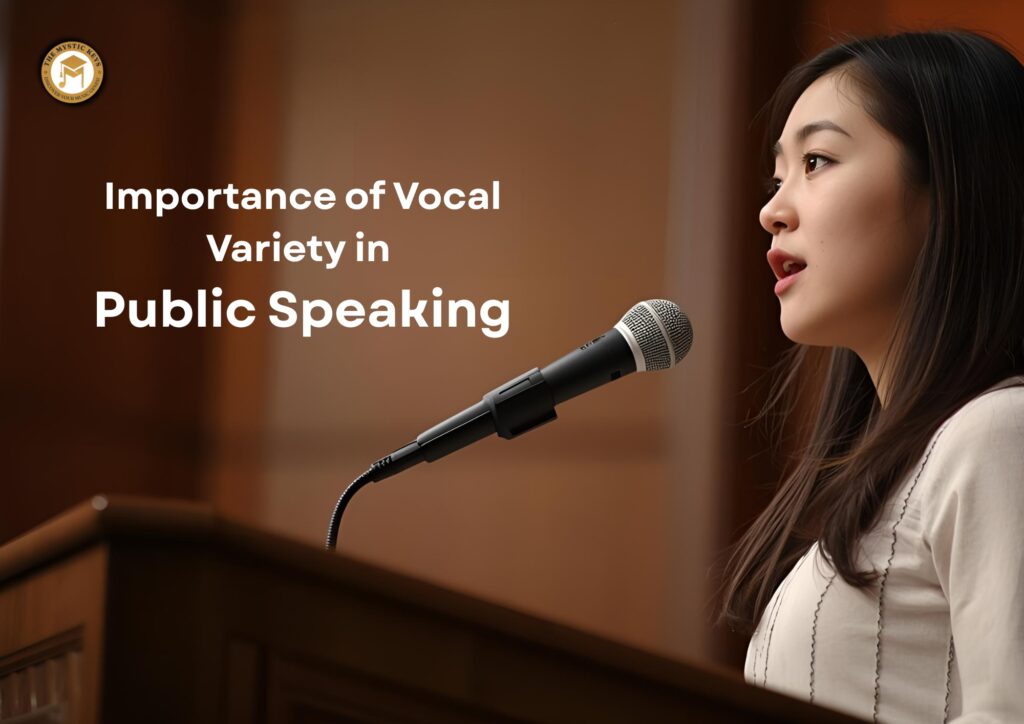
Importance of Vocal Variety in Public Speaking
Importance of Vocal Variety in Public Speaking
Public speaking is often thought of as the art of delivering words with clarity and confidence. While these aspects are undoubtedly essential, the importance of vocal variety cannot be overstated. One element that truly separates an engaging speaker from a monotonous one is vocal variety. It refers to the intentional changes in pitch, tone, volume, pace, and pauses that a speaker uses to keep an audience engaged. In essence, vocal variety is the “music” behind the words—the rhythm and melody that make a speech come alive.
Without vocal variety, even the most powerful speech can sound flat and lose impact. With it, even simple ideas can resonate deeply, inspire, and move an audience. Let’s explore why vocal variety is so crucial in public speaking and how you can develop it.

Capturing and Holding Attention
Audiences today are more distracted than ever. A speaker who uses the same tone throughout a presentation risks losing listeners within minutes. Vocal variety acts as a natural attention-grabber. By shifting pitch, raising or lowering volume, or varying speed, you create moments of surprise and anticipation.
For example, speaking softly right before delivering a powerful line can make the audience lean in with curiosity. On the other hand, raising your volume at a crucial point can emphasize importance and urgency. These fluctuations keep people alert and engaged.

The Importance of Vocal Variety in Adding Emotional Depth
Words convey information, but your voice conveys emotion. A story about resilience, for instance, becomes far more powerful when told with a voice that reflects the pain of struggle and the triumph of victory. The importance of vocal variety lies in its ability to communicate sincerity, excitement, humor, or empathy. It gives emotional color to your words, making the audience feel rather than just listen. When people connect emotionally, they remember your message longer and are more likely to act upon it.

The Importance of Vocal Variety in Emphasizing Key Points
Every speech has a core message. However, when delivered in a monotonous tone, important points may blend into the background. Vocal variety helps you underline significance.
A slower pace during a key message allows the audience to absorb it. Raising pitch slightly on a critical word draws focus. Pausing after an impactful statement lets the message sink in. Essentially, vocal variety works as a highlighter for your speech, guiding listeners to the parts that matter most.

Reflecting Authenticity and Confidence
A flat, monotone delivery often signals nervousness, lack of preparation, or disengagement. In contrast, speakers who employ vocal variety project confidence and enthusiasm. It shows that you care about the message and about your audience.
Authenticity is crucial in public speaking. By allowing your natural voice to fluctuate with genuine emotion, you appear more relatable and trustworthy. Audiences respond more positively when they sense that the speaker is speaking from the heart rather than reading mechanically.

Preventing Listener Fatigue
Listening to a monotonous voice is mentally exhausting. Studies in communication show that variation in voice keeps the brain stimulated, while monotony leads to disengagement. This highlights the importance of vocal variety—it acts as the key element that transforms a dull delivery into one that keeps the audience alert and connected.
Think of it like music—no one wants to hear a single note repeated endlessly. Just as a good song uses changes in rhythm and melody to keep listeners entertained, a good speaker uses vocal variety to prevent fatigue and sustain interest throughout the talk.

The Importance of Vocal Variety in Storytelling
Storytelling is one of the most powerful tools in public speaking, and vocal variety is what gives it life. Characters, emotions, and dramatic moments don’t just exist in the words themselves—they come alive through the way you use your voice.
For example, lowering your pitch when quoting a serious character draws your audience into the weight of the moment, while quickening your pace when narrating an exciting event builds suspense and energy. These subtle shifts act like brushstrokes on a canvas, turning simple words into a vivid experience that helps listeners not only understand but also feel the story.

Enhancing Persuasion
Public speaking is often about persuasion—convincing people to adopt an idea, support a cause, or take action. Vocal variety strengthens persuasion by making your arguments sound more compelling.
A passionate tone conveys conviction, while a softer voice can project thoughtfulness. Strategic pauses allow your audience to reflect on the importance of your words. Together, these techniques enhance credibility and make your message more persuasive.

Techniques to Develop Vocal Variety
If vocal variety doesn’t come naturally, the good news is that it can be practiced and mastered. Here are a few strategies:
Record Yourself: Play back your speeches to notice patterns in your tone and identify where variation is lacking.
Practice Reading Aloud: Use books, speeches, or poetry to experiment with changes in pitch, pace, and volume.
Mark Your Script: Highlight points where you want to slow down, pause, or emphasize.
Use Pauses Effectively: Silence can be just as powerful as words, giving listeners time to process.
Breathe Properly: Controlled breathing allows you to support volume and maintain a steady yet dynamic delivery.
Imitate Great Speakers: Study leaders, actors, or storytellers who use vocal variety effectively.

Common Challenges in Mastering the Importance of Vocal Variety
Many speakers struggle with vocal variety because they fear sounding unnatural or exaggerated. The key is to align your voice with genuine emotion. Over-rehearsing can sometimes flatten delivery, so it’s essential to keep your tone flexible and responsive to the moment.
Another challenge is nerves, which can cause a speaker’s voice to become shaky or monotone. Practicing relaxation and breathing techniques before speaking helps calm nerves and makes it easier to deliver with natural variety.

Conclusion
Vocal variety is not just an accessory to public speaking—it is its lifeblood. It breathes energy into your words, creates emotional impact, and ensures your audience remains attentive and engaged. Without it, even the most carefully crafted message risks being forgotten.
By practicing vocal variety, you not only improve your delivery but also enhance your ability to connect, persuade, and inspire. At The Mystic Keys, our Public Speaking Course Online is designed to help you master techniques like vocal variety, body language, and storytelling so you can communicate with confidence and impact.
Remember, public speaking is not just about what you say—it’s about how you say it. And with vocal variety, your voice can become the most powerful tool in your communication arsenal.
For more information and exciting resources about learning music, visit our website at The Mystic Keys. For more music content and exciting offers follow us on
Facebook, Instagram, YouTube, LinkedIn, Twitter, Pinterest, and Threads,

